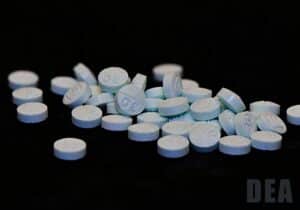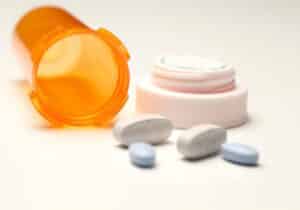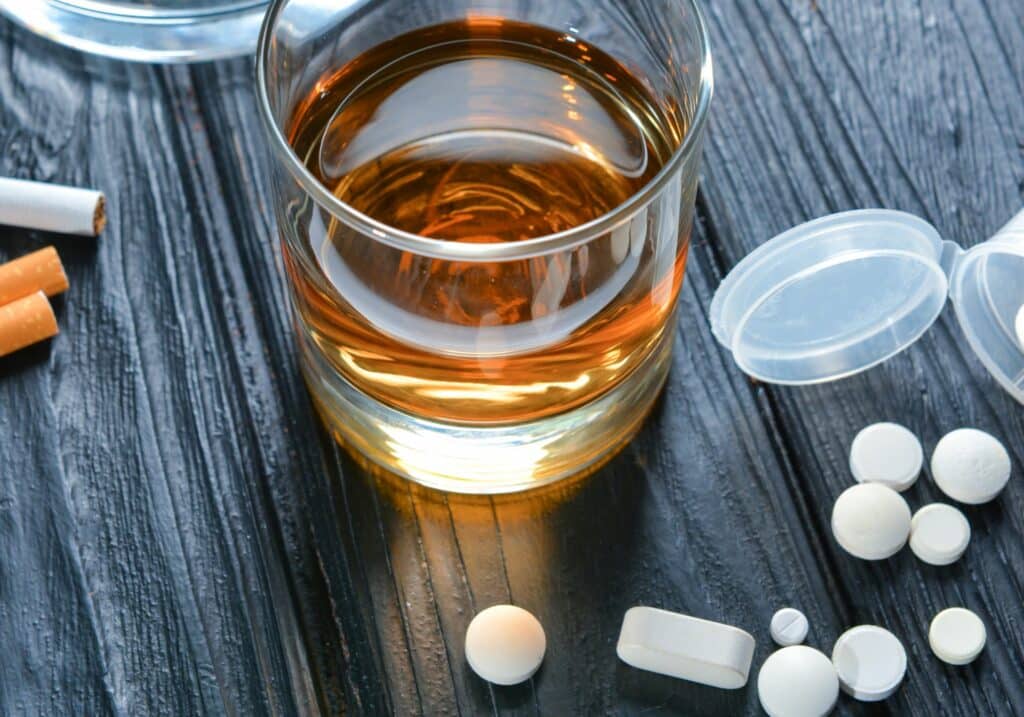Major depression is a prevalent mental health condition across the United States, with an estimated 21 million adults experiencing at least one major depressive episode in 2020. Fortunately, depression is manageable through methods like psychotherapy, which targets depression’s roots, and medication, which alleviates its symptoms. However, combining antidepressants with alcohol can counteract the medication’s benefits and lead to harmful side effects. While alcohol may provide temporary solace from depression’s discomfort, it’s risky when used alongside antidepressants.
Here’s what’s covered in this article:
- Understanding antidepressants and their varieties.
- The interaction between antidepressants and alcohol.
- Treatment strategies for concurrent depression and alcohol misuse.
Mixing Alcohol And Antidepressants
Alcohol acts as a depressant, slowing down vital functions like heart rate, blood pressure, and breathing. When mixed with antidepressants, the combination can be hazardous and, in some cases, lethal. It’s highly advised against because alcohol and certain antidepressants can increase drowsiness and reduce alertness, leading to difficulties in daily life, health problems, and safety risks.
The interaction between alcohol and antidepressants becomes particularly complex for individuals who drink heavily or have an alcohol use disorder prior to starting antidepressant treatment. Additionally, discontinuing antidepressants to self-medicate depression symptoms with alcohol can exacerbate the condition.
What are Antidepressants?
Antidepressants are medications designed to manage depressive disorders, extending their benefits to conditions like major depressive disorder, obsessive-compulsive disorder, and generalized anxiety disorder. Initially, it was believed that their mechanism was solely based on altering the brain’s use of specific neurotransmitters, thus regulating mood and behavior. However, recent studies suggest that antidepressants also promote neuroplasticity, enabling the brain to reorganize itself in response to new information, which facilitates adaptive responses to various stimuli.
Types of Antidepressants
Numerous classes of antidepressants are available, each suited to different therapeutic needs. Common types of antidepressants include:
- Selective Serotonin Reuptake Inhibitors (SSRIs): The most prescribed antidepressants, SSRIs like citalopram (Celexa), escitalopram (Lexapro), fluoxetine (Prozac), and sertraline (Zoloft) work by increasing serotonin levels in the brain.
- Serotonin-Norepinephrine Reuptake Inhibitors (SNRIs): Used for depression and anxiety, SNRIs include duloxetine (Cymbalta), venlafaxine (Effexor), and desvenlafaxine (Pristiq).
- Atypical Antidepressants: For those unresponsive to SSRIs or SNRIs, atypical options like bupropion (Wellbutrin) and mirtazapine (Remeron) are alternatives.
- Serotonin Modulators: This group, including trazodone, vilazodone (Viibryd), and vortioxetine (Trintellix), offers additional choices beyond SSRIs and SNRIs.
- Tricyclic and Tetracyclic Antidepressants (TCAs): Though less commonly prescribed due to potential cardiovascular risks, TCAs like nortriptyline (Pamelor) and desipramine (Norpramin) are available.
- Monoamine Oxidase Inhibitors (MAOIs): Rarely used as first-line treatments due to their side effects and dietary restrictions, MAOIs include isocarboxazid (Marplan), moclobemide (Manerix), phenelzine (Nardil), selegiline (Emsam patch), and tranylcypromine (Parnate).
Choosing the right antidepressant is a decision that should be made in consultation with a healthcare provider to ensure the most effective and safe treatment plan.
How Antidepressants Work
Depression can sometimes stem from lower serotonin levels in the brain, a neurotransmitter often referred to as the “feel-good chemical” due to its role in fostering wellbeing. Selective Serotonin Reuptake Inhibitors (SSRIs) such as Paxil, Prozac, Zoloft, and Lexapro, along with Monoamine Oxidase Inhibitors (MAOIs), are types of antidepressants designed to increase serotonin levels. These medications are known for their efficacy in alleviating depression symptoms, usually with manageable side effects.
By adjusting the balance of neurotransmitters, these drugs enhance mood, sleep quality, concentration, appetite, energy, and motivation. For example, Cymbalta not only addresses depression but also manages fibromyalgia-related nerve pain, and other antidepressants have been noted for their effectiveness in treating migraines and other physical pains. This aspect of pain management is crucial since depression can amplify physical discomfort, and vice versa, creating a cycle of worsening conditions. The primary goal of antidepressants is to mitigate depression symptoms, alleviate physical pain, and support individuals in achieving a more fulfilling life.
The Link Between Depression and Alcohol Abuse
Depression is a profound mental health condition characterized by persistent low mood, a sense of despair, and disinterest in everyday activities. For some, the struggle to manage these feelings leads to the use of alcohol as a form of self-medication. While drinking in moderation may be harmless for many, excessive alcohol consumption can spiral into addiction.
The relationship between depression and alcohol misuse is notably significant. Research indicates that a substantial 63.8% of individuals with alcohol dependence also experience depression, highlighting a common co-occurrence of these issues. Further analysis of various studies has shown that individuals diagnosed with major depressive disorder frequently struggle with alcohol use disorders.
This correlation suggests that individuals being treated for depression need to be mindful of the potential for alcohol misuse, especially considering the adverse interactions that can arise from combining alcohol with antidepressant medications.
Dangers of Mixing Alcohol and Antidepressants
Mixing alcohol and antidepressants poses several risks and potential complications, with the severity varying depending on the specific type of antidepressant medication. While SSRIs (Selective Serotonin Reuptake Inhibitors) combined with alcohol generally don’t lead to dangerous outcomes, they can cause drowsiness and lethargy, heightening the risk of accidents and injuries. This behavior might suggest a looming risk of alcohol addiction, especially concerning since individuals with depression are already more susceptible to addiction disorders. The concurrent use of alcohol and antidepressants amplifies this vulnerability.
Individuals who consume alcohol while on antidepressants may be inclined to skip their medication to avoid the adverse effects of mixing the two, which can exacerbate depression symptoms. Antidepressants are most effective when taken consistently over time, as fluctuating doses can hinder their efficacy.
Among antidepressants, monoamine oxidase inhibitors (MAOIs) carry the highest risk when combined with alcohol. The FDA specifically advises against consuming alcohol with MAOI antidepressants like Parnate due to the potential for severe central nervous system depression and life-threatening side effects.
However, MAOIs are not the only antidepressants that pose risks when taken with alcohol. The interaction between alcohol and SSRIs, along with other types of antidepressants, can intensify side effects, leading to increased drowsiness and impaired coordination. In rare instances, mixing alcohol with antidepressants may trigger “pathological intoxication,” where the individual experiences significant alcohol-induced impairment, possibly becoming violently disinhibited. Antidepressants may also affect alcohol tolerance or amplify its effects for some individuals.
Can I Drink Alcohol While Taking Antidepressants?
Mixing alcohol with antidepressants is generally advised against, as both can induce drowsiness, reduce alertness, and impair coordination, effects that intensify when these substances are mixed. However, understanding that abstaining from alcohol entirely may not be feasible for everyone, it’s crucial to approach the combination of alcohol and antidepressants as safely as possible.
Some healthcare providers may permit moderate alcohol consumption while on antidepressants, defining moderate as up to one drink daily for women and up to two for men, with “one drink” equating to 12 ounces of beer, 5 ounces of wine, 1 ounce of 80-proof whiskey, or 1 ounce of 100-proof spirits. To mitigate alcohol’s impact, it’s advisable to drink slowly and eat alongside drinking. Yet, it’s essential to first understand how an antidepressant affects you individually, as many can cause drowsiness, dizziness, and a decrease in alertness. Those experiencing these side effects may find the combined impact of alcohol and antidepressants too impairing for everyday activities like driving or operating machinery.
Mixing alcohol with antidepressants carries significant risks, including the potential for fatal outcomes. Alcohol itself can worsen depression and interfere with the effectiveness of antidepressants, possibly heightening suicidal thoughts or behaviors. Drinking while on MAOI antidepressants can dangerously elevate blood pressure, risking a stroke. Additionally, the liver might struggle to process the toxins from both substances, leading to potentially lethal toxicity.
Ultimately, while there are substantial risks in mixing alcohol with antidepressants, if you choose to drink, do so with moderation and awareness of the dangers.
What Happens When you Drink Alcohol with Antidepressants?
Mixing alcohol and antidepressants can lead to varied and sometimes unpredictable outcomes. Here’s what might happen if you consume alcohol while on these medications:
- Enhanced Intoxication: Antidepressants may amplify alcohol’s effects, leading to quicker and more intense intoxication. This heightened state can compromise your coordination, alertness, and judgment, heightening the risk of accidents. There’s also an increased chance of experiencing alcohol-induced blackouts, where memories of events while intoxicated are lost. These blackouts can lead to dangerous and regrettable actions.
- Unpredictable Reactions: The way alcohol interacts with antidepressants can differ greatly from one person to another, and even from one occasion to the next. While you might not have noticed adverse effects initially, subsequent alcohol consumption could result in negative reactions, making it difficult to predict how you’ll be affected each time.
- Impact on Mental Health: Alcohol can disrupt sleep and exacerbate symptoms of mental health conditions, such as anxiety and depression. For those taking antidepressants to manage these issues, mixing with alcohol might negate the medication’s benefits, potentially worsening your condition and complicating treatment.
Given the complexities and potential risks of mixing alcohol with antidepressants, prioritizing your health is crucial. While moderate drinking may be manageable for some, the interactions and their effects are largely unpredictable.
If you’re uncertain about the safety of drinking while on antidepressants, or if you’re concerned about your mental health, seeking professional advice and support is key. Remember, reaching out for help is a sign of strength, and there are resources and people ready to assist you. Your wellbeing is important, and support is available whenever you need it.
The Effects Of Combining Alcohol With Antidepressants
Mixing antidepressants, particularly Monoamine Oxidase Inhibitors (MAOIs), with alcohol can dangerously elevate blood pressure, leading to potentially fatal strokes. Other types of antidepressants, when combined with alcohol, may induce drowsiness, dizziness, and impair the ability to drive or operate heavy machinery, as well as cause concentration difficulties. Tragically, this combination has led to fatalities, with increased risks of suicidal ideation and behavior.
Individuals who substitute antidepressants with alcohol for self-medication may escalate their drinking, risking the development of an alcohol use disorder. For those with a history of depression, this increases the likelihood of:
- Alcohol abuse
- Liver cirrhosis
- Advanced alcoholism
- Miscarriage
- Liver damage
- Anxiety
- Profound feelings of despair and worthlessness
- Suicidal thoughts
Alcohol can exacerbate the side effects of certain antidepressants and vice versa, especially concerning liver health. Both alcohol and many medications are processed by the liver, putting excessive strain on this vital organ. Beyond the liver, heavy or moderate drinking adversely affects other organs, including the brain, potentially leading to cognitive impairments and diminished brain function.
Can You Skip Taking Antidepressants to Drink Alcohol?
Mixing alcohol and antidepressants can pose serious risks. But what about omitting a dose of your antidepressant to indulge in alcohol?
Technically, it might seem feasible to skip a dose to drink alcohol, but this decision should only be made after consulting with a healthcare professional. However, it’s crucial to remember that omitting prescribed medication without medical advice is not recommended.
Antidepressants are most effective when taken regularly as prescribed. Missing doses, even just one or two, can lead to a resurgence of depressive symptoms and potentially heighten the risk of a relapse, especially considering that alcohol can exacerbate depression symptoms.
Moreover, discontinuing antidepressants suddenly can trigger withdrawal symptoms, which might become more severe the longer the medication has been used.
Abruptly stopping antidepressant medication can cause antidepressant discontinuation syndrome, characterized by symptoms such as fatigue, nausea, sweating, seizures, dizziness, anxiety, mood changes, aggression, or vertigo.
Who is Most Likely to Abuse Antidepressants and Alcohol?
While most individuals prescribed antidepressants adhere to their medication regimen responsibly, a particular group may be at increased risk for combining antidepressants with alcohol, despite the known risks. Individuals with a prior history of substance abuse stand out as especially prone to this hazardous behavior. If someone demonstrates a pattern of misusing prescription medications, including antidepressants, it’s crucial they receive a referral to an addiction specialist for comprehensive evaluation and potential addiction treatment.
Co-Occurring Depression and Alcohol Addiction Treatment in Chattanooga, TN
For individuals grappling with both depression and alcohol addiction, a coordinated treatment plan that targets both conditions simultaneously is crucial. Here’s an outline of the integrated treatment approach:
- Medical Detox: This initial step involves medically supervised detox to safely eliminate alcohol from the body, ensuring the process is as comfortable as possible with professional oversight.
- Medication Management: For those battling both alcohol use and depressive disorders, antidepressants may be effective in alleviating depressive symptoms. Other medications beneficial in treating alcohol addiction include naltrexone, to lessen alcohol’s pleasurable effects; acamprosate, to support alcohol abstinence; and disulfiram, which discourages drinking by causing adverse reactions when alcohol is consumed.
Research indicates that using medications to treat alcohol addiction alongside depression is both safe and beneficial in reducing alcohol consumption and alleviating depressive symptoms.
- Behavioral Therapies: Various therapeutic interventions can be part of the treatment, such as:
- Motivational enhancement therapy to boost motivation for change.
- Cognitive-behavioral therapy (CBT) to develop coping strategies.
- Contingency management for reinforcing positive behaviors.
- Participation in 12-step or similar mutual-help groups.
At Iris Wellness Group, we stand ready to support individuals looking to overcome the dual challenges of alcohol use and depressive disorders. Our team, comprised of medical and therapy professionals, is equipped to evaluate your specific needs and design a personalized, comprehensive treatment plan that addresses both your mental health and substance use issues. Remember, both addiction and mental health conditions are treatable. Contact us today to start your journey towards recovery.










